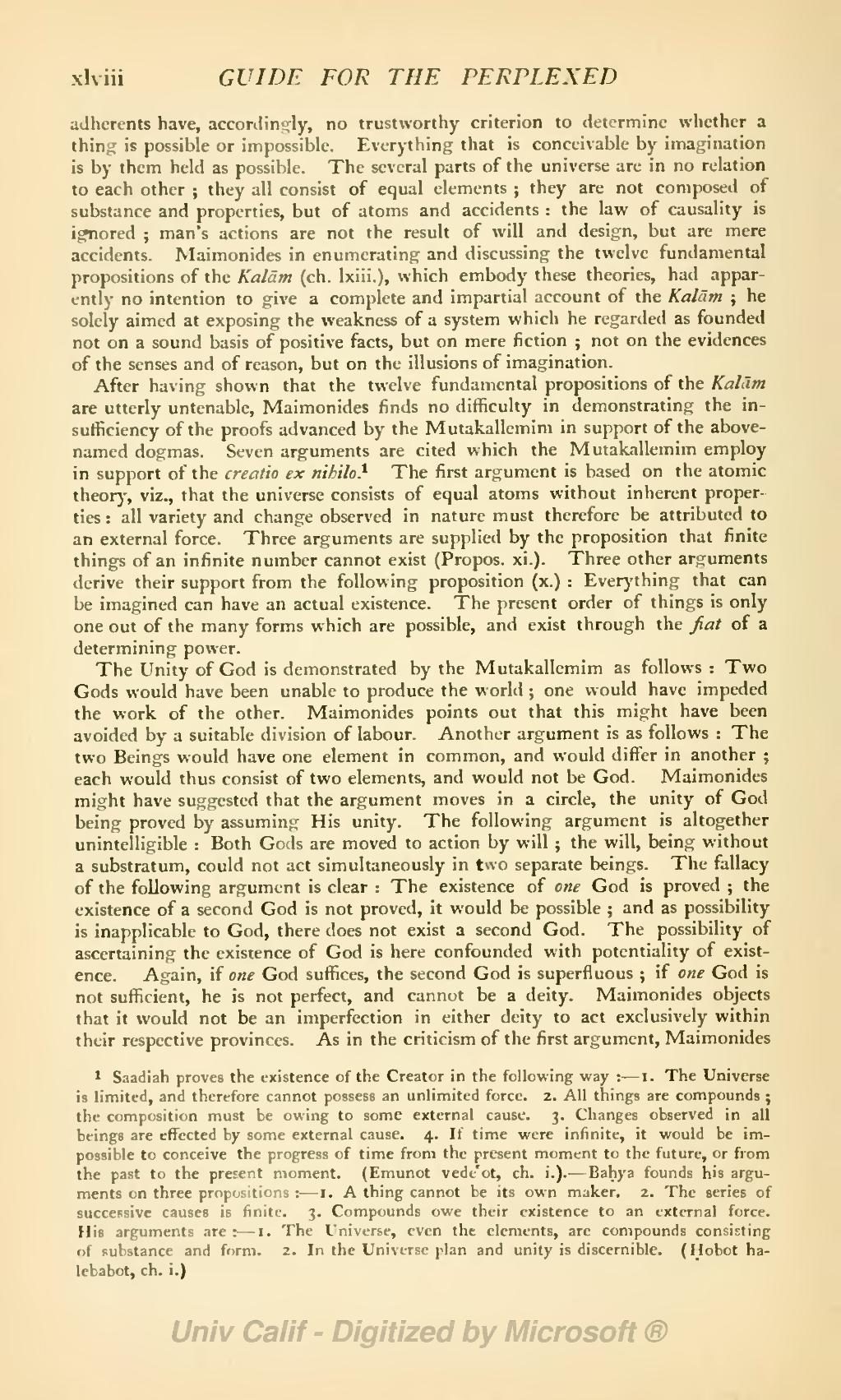have, accordingly, no trustworthy criterion to determine whether a thing is possible or impossible. Everything that is conceivable by imagination is by them held as possible. The several parts of the universe are in no relation to each other; they all consist of equal elements; they are not composed of substance and properties, but of atoms and accidents the law of causality is ignored; man's actions are not the result of will and design, but are mere accidents. Maimonides in enumerating and discussing the twelve fundamental propositions of the Kalam (ch. lxiii,), which embody these theories, had apparently no intention to give a complete and impartial account of the Kalam; he solely aimed at exposing the weakness of a system which he regarded as founded not on a sound basis of positive facts, but on mere fiction; not on the evidences of the senses and of reason, but on the illusions of imagination.
After having shown that the twelve fundamental propositions of the Kalam are utterly untenable, Maimonides finds no difficulty in demonstrating the insufficiency of the proofs advanced by the Mutakallemim in support of the above-named dogmas. Seven arguments are cited which the Mutakallemim employ in support of the creatio ex nihilo.3 The first argument is based on the atomic theory, viz., that the universe consists of equal atoms without inherent properties all variety and change observed in nature must therefore be attributed to an external force. Three arguments are supplied by the proposition that finite things of an infinite number cannot exist (Propos. xi.). Three other arguments derive their support from the following proposition (x.) Everything that can be imagined can have an actual existence. The present order of things is only one out of the many forms which are possible, and exist through the fiat of a determining power.
The Unity of God is demonstrated by the Mutakallemim as follows: Two Gods would have been unable to produce the world; one would have impeded the work of the other. Maimonides points out that this might have been avoided by a suitable division of labour. Another argument is as follows The two Beings would have one element in common, and would differ in another each would thus Consist of two elements, and would not be God. Maimonides might have suggested that the argument moves in a circle, the unity of God being proved by assuming His unity. The following argument is altogether unintelligible: Both Gods are moved to action by will; the will, being without a substratum, could not act simultaneously in two separate beings. The fallacy of the following argument is clear: The existence of one God is proved; the existence of a second God is not proved, it would be possible; and as possibility is inapplicable to God, there does not exist a second God. The possibility of ascertaining the existence of God is here confounded with potentiality of existence. Again, if one God suffices, the second God is superfluous; if one God is not sufficient, he is not perfect, and cannot be a deity. Maimonides objects that it would not be an imperfection in either deity to act exclusively within their respective provinces. As in the criticism of the first argument, Maimonides seems here to forget that the existence of separate provinces would require a superior determining Power, and the two Beings would not properly be called Gods.
1 Saaiah proves the existence of the Creator in the following way:--1. The Universe is limited, and therefore cannot possess an unlimited force, 2. All things are compounds the composition must he owing to some external cause, 3. Changes observed in all beings are effected by some external cause, 4. If time were infinite, it would be impossible to conceive the progress of time from the present moment so the future, or from the past to the present moment. (Emunot vede'ot, ch. i.).--Bahys founds his arguments on three propositions: --1. A thing cannot be its own maker, 2. The series of successive causes is finite. 3. Compounds owe their existence to an external force. His arguments are:--1. The Universe, even the elements, are compounds consisting of substance and form. 2. In the Universe plan and unity is discernible. ( Hobot halehsbot, ch. i.)
